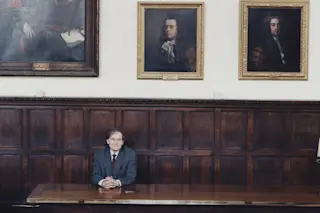Roger Penrose could easily be excused for having a big ego. A theorist whose name will be forever linked with such giants as Hawking and Einstein, Penrose has made fundamental contributions to physics, mathematics, and geometry. He reinterpreted general relativity to prove that black holes can form from dying stars. He invented twistor theory — a novel way to look at the structure of space-time — and so led us to a deeper understanding of the nature of gravity. He discovered a remarkable family of geometric forms that came to be known as Penrose tiles. He even moonlighted as a brain researcher, coming up with a provocative theory that consciousness arises from quantum-mechanical processes. And he wrote a series of incredibly readable, best-selling science books to boot.
And yet the 78-year-old Penrose — now an emeritus professor at the Mathematical Institute, University of Oxford — seems to live the humble ...














